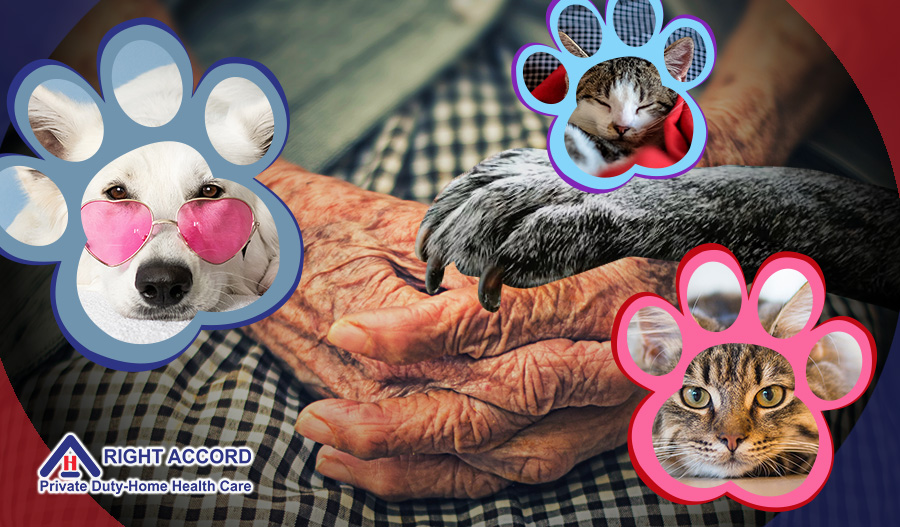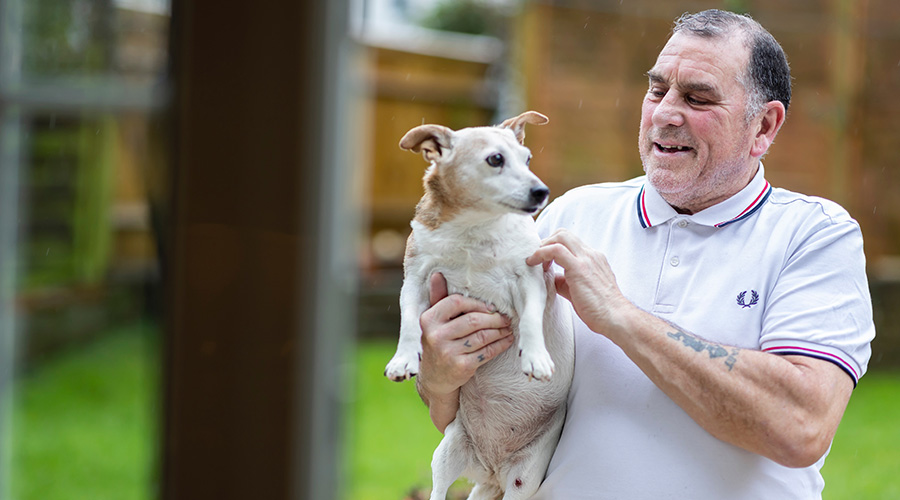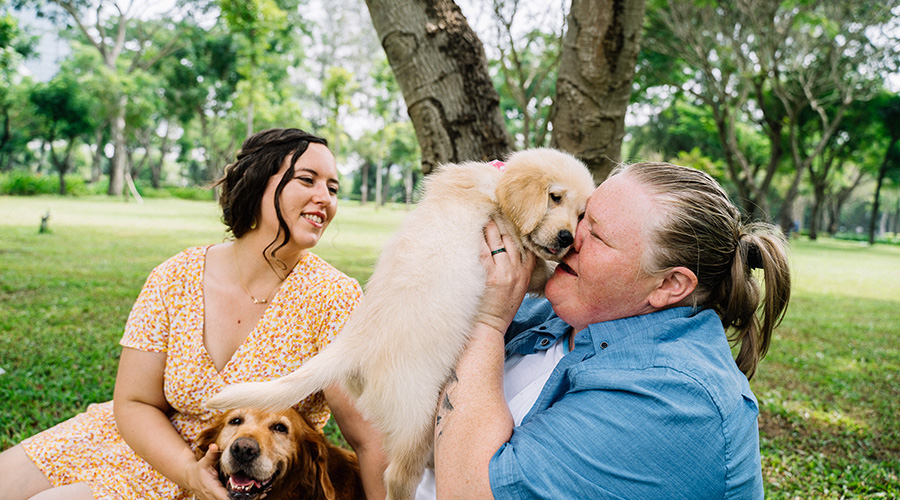· 7 min read
How Pets Can Improve the Seniors Mental Health and Wellbeing
Companion animals can provide a variety of benefits for seniors, from reducing loneliness and social isolation to improving physical health and reducing stress.

By: Rosemarie Tamunday Casanova — RN, BSN, MHA
As we age, our physical and mental health can decline, leading to feelings of loneliness, isolation, and depression. However, there is mounting evidence to suggest that owning a companion animal can improve senior mental health and wellbeing.
Whether it’s a furry feline or a loyal canine, animals have a way of lifting our spirits and bringing joy into our lives. In this article, we’ll explore the many ways that companion animals can positively impact the lives of seniors, from reducing stress and anxiety to providing a sense of purpose and companionship.
So, if you’re a senior looking for a way to improve your mental health and wellbeing, or you know someone who could benefit from a furry companion, paws for thought and read on to discover the many benefits of sharing your life with a four-legged friend.
The benefits of companion animals for seniors

Companion animals can provide a variety of benefits for seniors. One of the most significant benefits is that they can reduce feelings of loneliness and social isolation. Many seniors live alone or have limited social interaction, which can lead to depression and other mental health issues.
Having a companion animal can provide a sense of purpose and companionship, which can improve mental health and wellbeing.
In addition to reducing loneliness, companion animals can also provide a sense of security and comfort. Many seniors worry about their safety and security, especially if they live alone. Having a companion animal can provide a sense of protection and comfort, which can help seniors feel more secure and at ease.
Companion animals can also provide a source of entertainment and joy. Pets are known for their playful and curious natures, which can bring a smile to anyone’s face. Whether it’s playing fetch with a dog or watching a cat chase a toy, companion animals can provide hours of entertainment and joy for seniors.
How companion animals can reduce loneliness and social isolation

Photo by CFAGB on Unsplash
Studies have shown that companion animals can reduce feelings of loneliness and social isolation in seniors. One study found that seniors who owned dogs were less likely to report feelings of loneliness than those who did not own dogs. Another study found that seniors who owned cats reported fewer feelings of loneliness and depression than those who did not own cats.
Companion animals can provide a sense of companionship and purpose, which can help seniors feel less isolated and alone. They can also provide opportunities for social interaction, as seniors may meet other pet owners while walking their dogs or visiting the vet.
The role of companion animals in stress reduction
Companion animals can also play a role in reducing stress and anxiety in seniors. Studies have shown that interacting with a pet can lower blood pressure and reduce stress hormones like cortisol. Petting a cat or dog can also release endorphins, which are natural mood-boosters.
In addition to the physical benefits, companion animals can also provide emotional support. Many seniors turn to their pets for comfort during times of stress or sadness. Having a loyal companion who is always by your side can provide a sense of comfort and security that can help reduce stress and anxiety.
Companion animals and physical health
Companion animals can also provide physical health benefits for seniors. Walking a dog, for example, can provide regular exercise, which is important for maintaining physical health. Regular exercise can improve cardiovascular health, reduce the risk of chronic diseases, and improve overall mobility and flexibility.
In addition to exercise, companion animals can also provide motivation for seniors to take care of themselves. Seniors who own pets may be more likely to maintain a healthy diet and get regular check-ups, as they want to ensure their pets are healthy and well-cared for.
Choosing the right companion animal for seniors
When choosing a companion animal for a senior, it’s important to consider their lifestyle and needs. For example, a senior who lives in a small apartment may not have the space for a large dog. A senior who has mobility issues may not be able to care for a high-energy pet that requires a lot of exercise.
It’s also important to consider the senior’s personality and preferences. Some seniors may prefer a low-maintenance pet like a cat, while others may want a more active companion like a dog. It’s important to choose a pet that matches the senior’s personality and lifestyle, as this will ensure a successful and happy companionship.
Tips for introducing a companion animal to seniors
Introducing a companion animal to a senior can be a delicate process. It’s important to take things slow and give the senior time to adjust to their new companion. Here are a few tips for introducing a pet to a senior:

Photo by Anna Tarazevich on Pexels
Start with short visits
If possible, start by having the pet visit the senior’s home for short periods of time. This will allow the senior to get used to the pet and see if they’re a good match.
Choose the right time
It’s important to introduce a pet when the senior is feeling calm and relaxed. Avoid introducing a pet during a stressful or busy time.
Make adjustments for safety
Ensure the home is safe for the pet and make any necessary adjustments, such as putting away fragile items or securing electrical cords.
Provide support
Offer support and guidance to the senior as they adjust to their new companion. This may include helping with pet care or providing resources for training and support.
Caring for companion animals as a senior

Photo by Tim Mossholder on Unsplash
Caring for a companion animal can be a big responsibility, especially for seniors who may have limited mobility or energy. However, there are many resources available to help seniors care for their pets. Some tips for caring for a companion animal as a senior include:
Establish a routine
Establish a regular routine for feeding, exercise, and playtime. This will help the pet feel more comfortable and secure.
Get help if needed
If caring for a pet becomes too difficult, consider reaching out for help. This may include hiring a pet sitter or asking friends and family for assistance.
Stay up-to-date on veterinary care
Regular veterinary care is important for ensuring the pet’s health and wellbeing. Seniors should make sure their pets are up-to-date on vaccinations and receive regular check-ups.
Stay active
Regular exercise is important for both seniors and their pets. Seniors should make an effort to stay active and take their pets for regular walks or playtime.
Resources for seniors to find companion animals and support
There are many resources available to help seniors find companion animals and support. Some resources include:
Local animal shelters
Many animal shelters have programs specifically for seniors, including adoption programs and volunteer opportunities.
Senior centers
Some senior centers have programs that connect seniors with companion animals or offer pet-friendly activities.
Pet therapy programs
Pet therapy programs connect seniors with trained therapy animals for companionship and emotional support.
Online resources
There are many online resources available for seniors looking for information on pet care and support.
Conclusion
Companion animals can provide a variety of benefits for seniors, from reducing loneliness and social isolation to improving physical health and reducing stress. Choosing the right companion animal and introducing them to a senior can be a delicate process, but with patience and support, it can lead to a happy and fulfilling companionship.
Seniors who are considering a companion animal should take the time to research their options and find the right pet for their lifestyle and needs. With a furry friend by their side, seniors can enjoy improved mental health and wellbeing for years to come.



